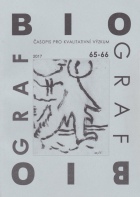
KONOPÁSEK, Z. (2017): Rozpaky nad inovacemi: ATLAS.ti, verze osmá. Biograf, 65-66: 103-115
::::Na konci loňského roku se objevila nová verze programu ATLAS.ti. Osmá. Pro uživatele starší verze programu je osmička krokem zpět. Nebo možná spíš někam jinam. Ani po několika měsících jsem si na tuhle novinku nezvykl a nepracuje se mi s ní dobře. Program se nyní poměrně krkolomně ovládá, prakticky nejde nastavit podle potřeb uživatele a nové funkce jen tak-tak kompenzují schopnosti, o které program v této aktualizaci přišel.
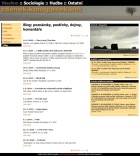
KONOPÁSEK, Z. (2017): K fenoménu Antropocén: Poznámky na okraj mezioborové debaty. Blog Zdeňka Konopáska, 22. 7. 2017. Dostupné na adrese http://zdenek.konopasek.net/index.php?m=16&b=16&i=3609
::::V Centru pro teoretická studia UK/AV ČR jsme začátkem roku 2017 začali probírat pojem antropocénu. Tímto slovem se nejčastěji vyjadřuje, že žijeme v epoše, ve které se člověk stal zásadní a hlavní silou, která formuje podobu planety. Antropocén je tedy název pro novou geologickou éru Země. V tomto textu se přimlouvám za složitější a širší chápání antropocénu – takové, které by otevíralo prostor pro mezioborovou diskusi. Jde o pracovní text, náčrt: připomínky a komentáře vítány. Pokud byste náhodou chtěli citovat, ujistěte se, že se mezitím neobjevila definitivní, oficiálně publikovaná verze.
KONOPÁSEK, Z. / KAREL, R. (2016): Kudy vedla cesta ke zcela osobitému pojetí vaší hudby? (rozhovor Romana Karla se Zdeňkem Konopáskem). In: Quod bene notandum - Liber secundus. Bruntál: J7K5/JeseKápě. Str. 125-126
::::Rozhovor ke kapele Noční pták a k jejímu vystoupení v SVČ Rýmařov při výroční výstavě Volného sdružení Octopus, dne 6. srpna 2016.
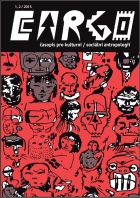
BROŽ, L. / STÖCKELOVÁ / KONOPÁSEK, Z. (2015): Symetrie je často stranická: rozhovor se Zdeňkem Konopáskem. Cargo, 13 (2): 117-132
::::
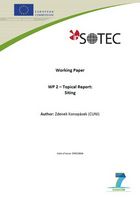
KONOPÁSEK, Z. (2014): Siting case studies. Topical report - working paper of the InSOTEC project (WP 2). Available at http://www.insotec.eu/publications/topicalreports
::::The InSOTEC case studies related to siting repositories of high-level radioactive waste do not and cannot come up with simple solutions or recipes. Rather, they suggest, more or less directly, that a slightly more reflective way of addressing sociotechnical tensions and complexities would be beneficial. During the controversies described, quite often one party claimed that a certain problem was ‘purely technical’ or ‘purely social’. However, just as often it was possible to successfully doubt such a claim and take it as a sign of a suspicious and unconvincing strategy of the opponent, because the issues were all so obviously entwined. The contribution of these case studies might consist in offering us an enhanced understanding of what occurs on the borderline between the ‘social’ and the ‘technical’. To talk about the sociotechnical challenges of deep geological disposal of nuclear waste would then mean to reflect on sociotechnical complexities – their highly specific, situated and, in a way, irreducible nature – but also, at the same time, preserve a sensitivity towards and understanding of the fact that these complexities are made manageable in practice by means of various simplifications and purifications. This is a difficult (seemingly contradictory) point with subtle political consequences, to which the cases presented hopefully provide at least some empirical background.
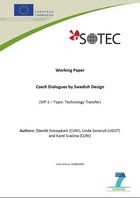
KONOPÁSEK, Z. / SONERYD, L. & SVAČINA, K. (2014): Czech Dialogues by Swedish Design. Working paper of the InSOTEC project (WP 2). Available at http://www.insotec.eu/publications/topical-reports
::::Transferring an elaborate design to a different setting is always an intricate business with uncertain results. This report takes this well-known lesson as a starting point for a study of the travel of a ready-made design for public dialogue on geological disposal. We want to discuss how established participative procedures are made to travel from one national context to another under the auspices of the EU and what the limits and consequences of such transfers are. The interesting thing for us is not only how the target setting is changed or not by the newly introduced practices, but also how the relatively well established participatory “technology” is itself being transformed during its transmission and implementation. Successes and failures of such a transfer have to be seen and assessed against the background of these mutual accommodations, translations and betrayals. Thus, our general interest is the fragility and ambiguous results of intentional and systematic spread of technical democracy across national and political contexts. More precisely, we will follow and critically discuss the story of how a Swedish design for public dialogues called RISCOM was transferred to the Czech Republic. We are going to show that, on the one hand, RISCOM made an important achievement in the Czech case, since it helped to bring all the main actors to a discussion table after previous negotiations had completely crashed. On the other hand, however, it seems that RISCOM substantially failed from a broader perspective. It found its way in the Czech Republic only at the cost of losing its specific original characteristics (and emphasizing new ones, rather controversial). As such, it quickly became associated with only too general appeals to dialogue, the attractiveness of which lived but shortly. It contributed to the increasing focus on dialogue per se, which ultimately led to frustration and impatience on both sides. This recently resulted in the shift toward more authoritative decision making in the Czech Republic and another crisis of mutual trust.
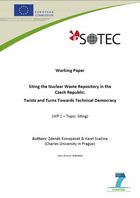
KONOPÁSEK, Z. & SVAČINA, K. (2014): Siting the Nuclear Waste Repository in the Czech Republic: Twists and Turns Towards Technical Democracy. Working paper of the InSOTEC project (WP 2). Available at http://www.insotec.eu/publications/topical-reports
::::We are going to present a story of a double turn: first, the turn toward deliberative procedures orchestrated by the implementer; this turn came after the initial period of expert driven decision making had led to public protests and failed. Second, we describe a turn back toward more authoritative and technocratic decision making after several-years long attempt at “technical democracy”, to use this famous term (Callon, Lascoumes & Barthe 2009), did not bring expected results quickly enough. While the former kind of turn appears relatively frequently in literature, often accompanied by an account of how subsequent deliberation brought about interesting results, the latter does not seem to be discussed too often – although similar failures may not be so rare. This could be related, among others, to the fact, that while the first kind of events documents the need to take “social aspects” of technology into account (and, eventually, an important role of social learning), telling about failing attempts at carefully orchestrated public dialogue (under the auspices of EU projects) complicates the point – which is what we would deliberately like to do in this case study; and by doing so we hope to join the discussion about the limits of participation and about how to “move beyond mere sloganizing over science and democracy”. We want to show that a misunderstanding about the meaning of the notion of “socio-technical” can be seen behind the described double turn. Socio-technical, at least as far as its STS origin implies, does not mean simply just adding a list of “social issues” to the technical agenda. Not in a way in which the two sets of aspects are kept apart, separated and hierarchically ordered as two different kinds of issues to be solved in different spaces and times. And not in a way which is simply based on gathering experts and lay people together so that they may speak to each other and therefore constitute a kind of “socio-technical” discourse. Instead (and in accordance to the work done within STS), the notion of socio-technical refers to analytical determination to approach and understand social and technical processes together, as a single network, i.e., going hand in hand, inseparably (i.e., Callon 1991; Latour 1991 and elsewhere). Something like this, of course, is hard to translate into policy practices and formalized public involvement – which is valid even more for policy cultures that have remained practically untouched by “the emerging interest in scientific citizenship today and multiple new forms of public participation in science and technology” and in which scientific expertise still very much enjoys the status of politically neutral authority, external to societal life. In a way, we are convinced that the siting process in the Czech Republic has fallen victim to the simplified understanding of what “socio-technical” means for technical democracy in the making.

KONOPÁSEK, Z. (2013): Sociologie, na které ne/záleží. Blog Zdeňka Konopáska, 24. 3. 2013. Dostupné na adrese http://zdenek.konopasek.net/index.php?m=16&b=16&i=2757
::::Nezávazný, lehkonohý vztah k teoriím tedy vede k tomu, že si jako sociologové zvykáme na nespoutané žvanění. Co nedovolí jedna myšlenková tradice, dovolí jiná. Přepnutí je bezbolestné. A je-li to ve jménu angažovanosti a v zájmu oslovení širokého publika, platí to dvojnásob. Vykecáme se ze všeho. Ze slov, co říkáme či neříkáme, se svět nezboří. Je to přece jenom sociologie, ne?... Líp už cestu k bezvýznamnosti a vyprázdnění vlastního oboru dláždit nemůžeme.

KONOPÁSEK, Z. (2013): Simulakrum jako nadávka? Blog Zdeňka Konopáska, 29. 1. 2013. Dostupné na adrese http://zdenek.konopasek.net/index.php?m=16&b=16&i=2728
::::Bělohradskému se opět podařilo vyprovokovat mne k sepsání malého sociologického komentáře - víc o sociologii než o samotných presidentských volbách.
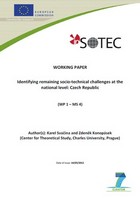
SVAČINA, K. & KONOPÁSEK, Z. (2012): Identifying remaining socio-technical challenges at the national level: Czech Republic. Working paper of the InSOTEC project (WP 1 – MS 4). Available at http://www.insotec.eu/publications/file-cabinet
::::This report describes the history, recent developments and the current situation of the management of highly radioactive waste and spent nuclear fuel in the Czech Republic, with a particular focus on the development of geological disposal for this kind of waste. Special attention is given to the interplay of social and technical aspects of the process. The first chapter gives an overview of the state of affairs and sketches out the trajectories leading to it. The institutional background, legislative framework and relevant government policies, as well as the role of affected communities and other civil society stakeholders are considered. The second chapter tries to identify the main socio-political challenges that the process of geological disposal development is currently facing. By socio-political challenges we mean problems and obstacles that complicate the negotiations between the implementer and other relevant groups, be it other state institutions, municipalities, or NGOs. The third chapter takes these observations a step further, and tries to identify significant socio-technical challenges within this process. By looking at the problems as socio-technical, we want to emphasize and highlight the fact that there is interplay of social and technical aspects, and that it is often problematic or counterproductive to consider them as separate, purely social and purely technical aspects. The ultimate goal of identifying significant socio-technical challenges then is to sketch out problems of interest for case study research in the second work package of InSOTEC.
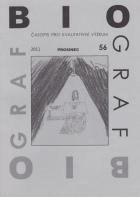
KONOPÁSEK, Z. (2011): Aby se pracovalo pěkněji: ATLAS.ti, verze sedmá. Biograf (56): 91-109
::::Moje doporučení přejít z předchozí na aktuální verzi ATLAS.ti není tak jednoznačné jako minule. Nenese to s sebou tolik analytického dobrodiní, které by vůbec nebylo dostupné dříve. Až na výjimky se pokrok soustředí na větší pohodlí (snadnější ovládání, lepší přehled). S programem se vám jistě bude pracovat pěkněji. Nepostradatelný bude tenhle upgrade v prvé řadě pro ty, kdo chtějí pracovat přímo se zvukem či videem. A také pro ty, kteří měli časté potíže s dostupností primárních dokumentů. Jinak se jedná o nahromadění drobných úprav a vylepšení či dotažení již existujících funkcí. Žádná revoluce to není; ale kus úsilí vyjít vstříc uživatelům ano. Pokud máte peníze a s ATLAS.ti vážné úmysly, nerozmýšlejte se a sedmičku si pořiďte. Ale pokud jedno nebo druhé chybí, nezoufejte. S šestkou to klidně ještě nějaký čas vydržíte.
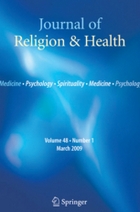
KONOPÁSEK, Z. / PALEČEK, J. (2012): Apparitions and possessions as boundary objects: An exploration into some tensions between mental health care and pastoral care. Journal of Religion and Health, 51 (3): 970-985
::::Apparitions and possessions can be taken as genuine spiritual events or as symptoms of psychopathology. We focus upon occasions when the two seemingly conflicting “interpretations” co-exist in order to explore these phenomena as a kind of boundary objects – polymorphous realities stable and graspable enough, yet belonging to different worlds at once. Related diagnostic knowledge is often uncertain and always incomplete. Yet it enables authoritative and effective professional interventions. We conclude by discussing the relevance of such a view for contemporary efforts to validate patients’ spiritual experiences within mental health care.
KONOPÁSEK, Z. (2011): Je prý třeba změnit ten postoj a ptát se... Blog Zdeňka Konopáska, 26. 2. 2011. Dostupné na adrese http://zdenek.konopasek.net/index.php?m=151&i=1871&b=151
::::Tak to říkal Václav Bělohradský o sociální reformě v Otázkách Václava Moravce (1. 2. 2011) a já se ošíval.
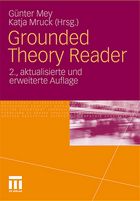
KONOPÁSEK, Z. (2011): Das Denken mit ATLAS.ti sichtbar machen: Computergestützte qualitative Analyse als textuelle Praxis. In: G. Mey & K. Mruck, eds.: Grounded theory reader. 2. aktualizované vydání. Wiesbaden: VS Verlag. Str. 381-403
::::How is a new quality of reading, which we call "sociological understanding", created during the process of qualitative analysis? A methodological (conventional) answer to this question usually speaks of mental processes and conceptual work. This paper suggests a different view—sociological rather than methodological; or more precisely a view inspired by a contemporary sociology of science. It describes qualitative analysis as a set of material practices. Taking grounded theory methodology and the work with the computer programme Atlas.ti as an example, it is argued that thinking is inseparable from doing even in this domain. It is argued that by adopting the suggested perspective we might be better able to speak of otherwise hardly graspable processes of qualitative analysis in more accountable and instructable ways. Further, software packages would be better understood not only as "mere tools" for coding and retrieving, but also as complex virtual environments for embodied and practice-based knowledge making. Finally, grounded theory methodology might appear in a somewhat different light: when described not in terms of methodological or theoretical concepts but rather in terms of what we practically do with the analysed data, it becomes perfectly compatible with the radical constructivist, textualist, or even post-structuralist paradigms of interpretation (from which it has allegedly departed by a long way). (Translated to German and reprinted from Historical Social Research 2007/FQS 2008)
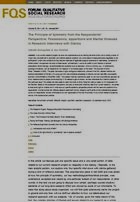
KONOPÁSEK, Z. / PALEČEK (2011): The principle of symmetry from the respondents’ perspective: Possessions, apparitions and mental illnesses in research interviews with clerics. Forum Qualitative Sozialforschung / Forum: Qualitative Social Research, 12 (1): čl. 12, http://nbn-resolving.de/urn:nbn:de:0114-fqs1101129
::::We study how experiences such as hearing the voice of the Lord or having a vision of Virgin Mary are dealt with in psychiatry and catholic pastoral practice. How the status of these phenomena is negotiated by the participants? Under what conditions they become an instance of legitimate religious experience or, alternatively, symptoms of mental illness? We approach the study of these issues “symmetrically” - we do not prefer a priori medical or spiritual explanations. Some time ago, we demonstrated and explained such an approach (which is common, e.g., in contemporary sociology of science), and its relevance for our research, in an analytic paper on the movie “The exorcism of Emily Rose” (2005). The paper discusses a highly ambiguous relationship, pictured in the film, between medical and spiritual interpretation of the story of a young girl who was considered possessed by demons and who died after unsuccessful exorcism (Konopásek & Paleček 2006). Now, the question is: can such a symmetrical approach be of any relevance also for people we are studying? In an attempt to give an answer, we have interviewed four catholic priests on this issue. The priests had been asked to watch the movie on Emily Rose and read our paper on it in preparation for the interview. Based on these discussions (and also on our current research in general), we would like to shed some light on whether and in what ways our specific epistemic perspective coheres with the views and positions of our respondents; and also, how this reflexive research experiment contributed to our own understanding of the role of the symmetry principle in our current research project.

 ? - recenze vyjde v časopise Biograf
? - recenze vyjde v časopise Biograf
 se objevily informace o tom, co lze snad prý během března čekat v nové, sedmé verzi mého oblíbeného analytického programu
se objevily informace o tom, co lze snad prý během března čekat v nové, sedmé verzi mého oblíbeného analytického programu










